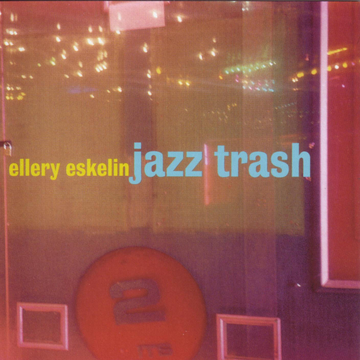Ellery Eskelin
Jazz Trash
SGL 1506-2“Eskelin has a great sound on the tenor saxophone: swaggering, rich, sensitive but not constrained…In the welter of clones claiming to inherit the ‘jazz tradition’, he is a welcome reminder of the special poignancy a saxophone can deliver.”
— Ben Watson, Hi-Fi News & Record Review
Ellery Eskelin’s fifth recording as a leader and his debut on Songlines develops concepts first charted in his trio release Figure of Speech (Soul Note), which was named one of the best jazz records of 1993 in the Village Voice critics poll. Continuing his use of unusual instrumentation, this time he puts a creative spin on the organ trio tradition; the result, says critic Kevin Whitehead, “is audacious (and concept-driven) even by his standards”. The program of originals includes uptempo and folkish pieces as well as several atmospheric, almost timeless themes, ending on a 7/4 blues. But, as Eskelin explains: “Rather than improvise with the themes, harmony or what have you, I’ve structured this music so that our improvisation often contrasts with the written. The improvisational strategies are different in each composition, creating a new format or shape for every piece…I should mention that Jazz Trash is not meant to denigrate jazz. It’s only meant to disarm those overly serious types who seem intent on fighting over who gets to carve the music’s tombstone. I love jazz, after all my mother plays Hammond B3 organ.” With collaborators whose experience in other areas of music consistently brings fresh perspectives and approaches to a jazz context, he has produced a CD that touches the listener with its power and eloquence.
In the twelve years since Eskelin moved to New York from Baltimore, he has performed and recorded with many of the music’s innovators. In addition to leading the present trio, he is a member of the cooperative group Joint Venture, Joey Baron’s trio Baron Down, Mark Helias’ quintet Attack the Future, and Phil Haynes’ 4 Horns and What?, and has also played recently with trombonist Ray Anderson. He has appeared on over twenty recordings and has come to be regarded as “one of the important jazz figures of his generation” (Robert Hicks, Jazziz) and a “tenor original” (Kevin Whitehead, Pulse).
Andrea Parkins is a composer and improvisor whose influences range from Conlon Nancarrow and Sun Ra to west African drumming and kora music. She has appeared in John Zorn’s Cobra and with musicians such as Otomo Yoshihide, Ikue Mori, Tenko and Joe Morris. She leads her own trio, and has has written solo pieces for accordion and sampler as well as ensemble pieces and music for dance, theater and film; she has also composed music and designed sound for her own sculptural installations and multi-media works. As an accordionist, Parkins expands the instrument sonically by combining extended techniques with fragmentation of traditional accordion syntax.
Jim Black attended Berklee College before moving to New York, where he has gained recognition for his highly textural, compositional style. He tours and records with Tim Berne’s Bloodcount and Dave Douglas’ Tiny Bell Trio (Songlines) and can also be heard with the Ben Monder Trio. He co-leads and composes for the collectives Human Feel and Pachora, is composing music for upcoming projects including a recording with Dewey Redman and Ed Schuller, and has recently performed with Jane Ira Bloom, Lee Konitz, Fred Hersch, John Zorn, Hank Roberts, Herb Robertson, Mark Dresser, Jerome Harris, Marc Ducret, Hal Crook, Django Bates, and Marty Ehrlich.
Best of 1995, Jazz Times and Cadence; Best of 1996, Cadence and Jazz Magazine (France)
“As radical and questioning as elements of Jazz Trash are, the disc is as imbued with jazz life. Eskelin’s personal compositional vision, his supple phrasing and gorgeous tenor sound all qualify him as a major player in today’s creative music…One of the great emergent talents of our time. — John Corbett, Down Beat
“A stimulating, adventurous recording which exemplifies all that’s desirable in creative improvised music: fearless curiosity, instrumental acumen and restless discovery…Emotionally, the music ranges from churning energy to dry, moody pastoralism…Intelligent and recommended.” — Carl Baugher, Cadence
“The end result is a display of edgy virtuosity that is constantly unpredictable, a mix of eerie rhythms and hair-raising playing that sounds like David Murray jamming with the Soft Machine…highly individual and highly recommended.” — Jerome Wilson, Option
“Eskelin affirms a very personal style…sometimes with power, always with beauty.” — Bernard Loupias, Jazz Magazine (Paris)
